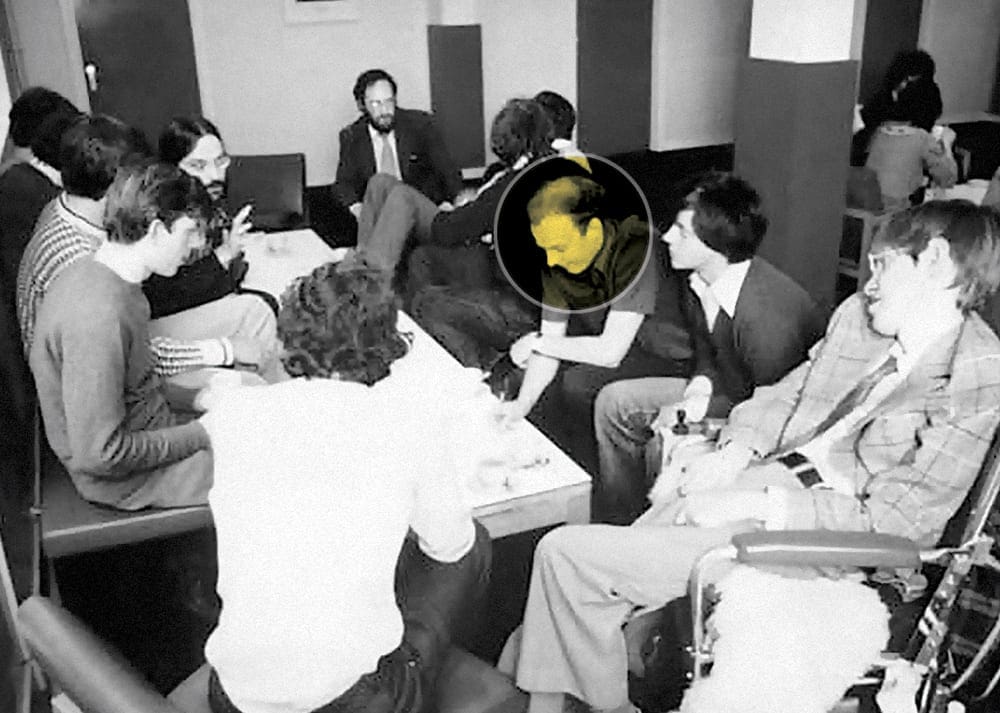I heard about Stephen Hawking’s death at midnight in Baltimore almost as soon it was announced in March 2018. At once, I had a flashback to Stephen turning in circles with his electric wheelchair with a broad grin on his face.
I did my PhD on quantum gravity with Stephen at Cambridge in the late 1970s. At that time, he was not yet world famous, although I remember TV producers, an astronaut, and a Hollywood actress visiting. But his reputation among physicists was exceptionally high. “He is already working at Einstein’s level, and if he succeeds in quantizing gravity, he will go down in history as being greater than Einstein,” one professor told me. “He’s cleaned up all the problems in general relativity, and now he is coming into our field of quantum mechanics, and he will clean it up also,” said another who had done Nobel Prize–quality work.
Up to that point, Stephen’s career had been a 10-year run of amazing success. As a graduate student, he had started by working on Einstein’s theory of general relativity (GR), which is arguably one of the greatest intellectual achievements of humankind. Unlike almost every other theory of physics, it was constructed by Einstein with almost no guidance from experiments. GR is not only aesthetically attractive—sometimes it is called the beautiful theory—but it also seeks to capture the large-scale structure of the universe itself. Indeed, the beauty of GR, together with its audacity of trying to “solve” the universe, seduced me as a 16-year-old schoolboy and converted my daydreams from becoming a professional sports player to becoming a second Einstein (leading to dramatic improvements in my academic work, to the surprise of my teachers).
But until the early 1960s, when Stephen’s research started, the conceptual and mathematical complexity of GR meant that its predictions were not clearly understood. It could only be solved in a very limited number of highly restricted settings, and it was unclear what the theory predicted in more realistic and unrestricted situations.
Stephen’s research on GR helped change all that. His advisor, Dennis Sciama, introduced him to new ways of thinking about GR that had recently been developed by the mathematician Roger Penrose (whose interest in GR had been inspired and encouraged by Sciama). This led to the so-called golden age of GR where Stephen, Penrose, and a few collaborators found a way to make predictions from GR in unrestricted situations. These results were astounding. They showed that black holes were extremely likely to occur, predicted most of their properties, and calculated what would happen when black holes collided. But with typical audacity, in his PhD thesis, Stephen turned these results on their head and showed that GR predicted that the universe had to start with a singularity, or big bang.
Only a few physicists in the world at that time had the physical intuition and the mathematical skills to make and understand these predictions. Stephen’s work in this area alone would have earned him a Nobel Prize if experiments had been able to confirm his predictions. Indeed, the recent discovery of gravitational waves was co-led by Stephen’s friend Kip Thorne.
But then, Stephen trumped this work in 1975 with his incredible prediction of black hole radiation, now known as Hawking radiation. The story goes that when Stephen presented his result at a conference, one of the organizers said it was complete nonsense and closed the session. The organizer’s reaction was not completely unreasonable, since Stephen’s result combined three completely separate and apparently unrelated areas of physics: GR, quantum mechanics, and thermodynamics. This suggests an as-yet-unrealized, deep connection among these fundamental theories. There is still no experimental verification of this result, and it is unclear how and when it will come, but the circumstantial evidence for it is so strong that most physicists think it must be true. The formula for Hawking radiation is etched on Stephen’s tombstone.
When I met Stephen two years later, he had left GR behind, finished analyzing Hawking radiation, and was setting his sights on developing a theory that unified quantum mechanics with GR. This was one of the last remaining big challenges in fundamental physics and a major step on the road to the holy grail of the theory of everything, which would unify all of physics.
The challenges of quantum gravity made me pause when I was offered the chance of doing a PhD supervised by Stephen. But his reputation—when could I ever work with somebody like him?—and his audacity and cheerfulness persuaded me. I first saw his famous grin when I asked him if there was any obvious way to test quantum gravity, and he answered “None!”
An Extended Family
Stephen’s research group was small and rather like being in an extended family. We hung around him during most of the day, and his wife, Jane, would visit sometimes with children Robert and Lucy (Timothy was born during that time). A postdoc, Don Page, and later a student, Nick Warner, lived in Stephen’s house and accompanied him to work and back home. We took turns to help feed him and perform other duties. (I still recall with shame that I once forgot to tell Stephen that I was going to London on a day when I was supposed to be looking after him.)
We occasionally went to films with him like Some Like It Hot and The Black Hole. I recall helping him play Dungeons and Dragons one afternoon when he was bored. I babysat his children once, and he held New Year’s Eve parties. But despite his friendliness and informality, I could never bring myself to call him “Stephen” to his face, perhaps because I’d gone to traditional English schools where first names were only used for very close friends.
“Stephen believes the best work is done in the tea room,” I was told when I started my PhD. At morning and afternoon tea, his group would sit together in the tea room and have informal discussions on various topics, including physics and almost everything else. At lunch, we’d all go a block away to the Graduate Center (known as the Grad Pad) or occasionally to a nearby pub. Free-ranging discussions would continue over lunch, and I recall learning about Chomsky’s theory of linguistics, which with typical physics arrogance, was described as being “basically trivial” (though not by Stephen).
At that time, Stephen could talk, but with increasing difficulty. I struggled to understand him but never really mastered it. During my first year, he stopped giving his own talks because it became clear that few people in the audience could understand his pronunciation. So he prepared his talks and sat on the podium as a student presented them. Being painfully shy at the time, I was glad that I was never asked to do this. Giving my own first talk in front of Stephen was challenging enough, though he gave me helpful advice beforehand and congratulated me afterward.
Indeed, I remember him as being supportive and encouraging, despite my frequent periods of lack of progress, and his sense of humor was almost always present. In particular, I remember him joking that maybe attempting to quantize gravity was the first sign that a physicist was going crazy (this is based on an English schoolboy joke; the second sign of madness would be thinking you had succeeded). His disability due to Lou Gehrig’s disease was almost never discussed, and he seemed determined never to let it stop him from doing anything. He was so cheerful and upbeat that, whenever he was present, the thought of feeling sorry for him never crossed my mind.
Self-Doubt Sparks a Shift
I rarely saw Stephen after finishing my PhD because I went directly to the United States to work on quantum gravity as a postdoc and shortly afterward left physics and switched to artificial intelligence.
During my PhD, I’d had long periods of self-doubt. My PhD thesis was reasonable, though not stellar, but its contributions were mainly mathematical and didn’t seem to make much progress toward quantizing gravity. Stephen’s Euclidean approach relied on a mathematic trick, called analytic continuation, and it was unclear to me that it could be justified. (“You can’t do that,” argued a U.S. quantum gravity expert; “I just did,” replied Stephen.) I wasn’t sure whether my doubts arose because of the difficulty of the problem or the limits of my intelligence. Perhaps I wasn’t smart enough to quantize gravity?
Stephen Hawking, (foreground right) meets with a group of his doctoral students at Cambridge University during the late 1970s. Alan Yuille, the author, is highlighted. [Photo courtesy of Alan Yuille]
During my first year in the U.S., I learned about alternative attempts to quantize gravity from the U.S. experts, but I wasn’t convinced by any of them. I started speculating that perhaps nobody was smart enough to quantize gravity, and, even if somebody succeeded, how would we know if no experiments could be done?
These doubts led me to switch subjects and move to MIT to work on AI and theoretical neuroscience. I preferred to work in a new area that was just starting, where there were many wide-open problems waiting to be explored, rather than in an area like physics, which seemed overworked, with problems that seemed fiendishly difficult. AI was also attractive to me because understanding the brain is surely as important as understanding the universe. Moreover, like physics, it was not purely ivory tower but instead had the potential to make a huge impact on the world (much current technology is based on 19th- and 20th-century physics). Finally, AI also involved mathematics, which I liked to do.
Stephen had long been interested in AI, and in his last years, he spoke out about its potential dangers, saying it could be “either the best, or the worst thing, ever to happen to humanity.” In 2015, he was a co-signer of the Open Letter on Artificial Intelligence, which called for research on the societal impacts of AI. As an active researcher in AI, I think the short-term risks of AI are often exaggerated, but I agree with Stuart Russell, an AI expert who also signed the letter, that “it is not too early to start thinking about these things.”
I note that Stephen’s willingness to publicly address the risks of AI reflected his broad interests and concerns about social issues, similar to the way he publicly argued that the National Health Service in the U.K. was being seriously weakened by shortage of government funding.
Sadly, I never had the chance to discuss these issues with Stephen, though I doubt that my opinions would have influenced him in the slightest. When I switched to AI in the early 1980s, he was interested in hearing about it on the few occasions that we met. In those days, of course, AI was very primitive and not advanced enough to threaten anything. But perhaps Stephen was already worrying about its potential. In 1979, he was appointed as the Lucasian Professor of Mathematics at Cambridge (his distinguished predecessors included Isaac Newton and Paul Dirac), and he gave his famous inaugural lecture, during which he speculated that physics might be over in 30 years. He ended it by joking that even if physics wasn’t over, then maybe physicists would be because they would all be replaced by computers! His worries here have so far been premature, and arguably, AI has enabled physicists to do better research.
My meetings with him after the early 1980s were infrequent. The most memorable was when he received an honorary fellowship at Harvard University. I was a junior faculty member at Harvard at the time (“Have you got a backup plan?” Stephen joked, knowing of Harvard’s reputation for treating junior faculty), and he kindly invited me to join him at the fellowship lunch, where we heard Ella Fitzgerald sing. (She was also receiving a fellowship.)
Another occasion, many years later, was at Caltech, where his rock-star status meant that his talk in a huge auditorium was sold out. Luckily, a friend of mine was able to exploit her press credentials and smuggled me in as a member of the press. This was the last time I saw Stephen. His condition had deteriorated, and he didn’t flash his usual grin of recognition but made warm eye contact instead. He started his talk by mentioning his first junior school, a little-known place called Byron House that has since closed, and which by a strange coincidence was also my first school.
Alan Yuille, Bloomberg Distinguished Professor of Cognitive Science and Computer Science, teaches a graduate research seminar based on topics in computational vision. Yuille says Stephen Hawking “can be considered one of the most heroic people of all time.”
A Heroic Endeavor
After leaving physics for AI, I followed physics at a distance as a type of spectator sport. In the first few years, I sometimes worried that I’d made a bad decision. Maybe there would be an enormous breakthrough in quantum gravity, I’d miss all the fun, and my friends would be celebrated in history? Perhaps Euclidean quantum gravity would succeed or, if not, perhaps alternatives like string theory and M-theory would turn out to be correct? I promised myself that if they did, I’d take a few months’ holiday and try to learn them.
But so far, I have not been persuaded to try. From a distance, it seems that the search for quantum gravity and a theory of everything is much harder than anticipated when the quest began. Lack of experimental data is a major hindrance.
My following of physics involved watching Stephen’s expanding role as a popularizer of science and as a scientific celebrity. His scientific writing was always brilliant because of his ability to get to the key points and use the best, and simplest, words to describe ideas. This may be partly due to his disability. As a student, I was privately frustrated when I occasionally helped Stephen with dictation because progress was very slow, with every word requiring an effort. But the result was exceptional clarity. This clarity of thought has translated brilliantly to his popular scientific writings and television presentations. I think of fundamental science as a heroic endeavor, somewhat similar to exploration. Historically, most explorations ended in failure, and those few that succeeded took many years and much hardship. Scientific progress, and understanding of the universe, requires that we keep exploring and honor those who make it their life’s work.
It is too early to tell whether Stephen’s work on the wave function of the universe and the no-boundary conditions of the early universe will be validated as his early work on GR and Hawking radiation almost certainly will be. The lack of experimental data, because the cost of doing the experiments exceeds our financial resources and technological skills, requires that physicists develop data driven by criteria like mathematical beauty as Dirac advocated. This gives uncertain and possibly misleading guidance, but it has also succeeded for physicists like Einstein, Dirac, and also Stephen. Moreover, lacking experimental guidance, it is hard to see what other strategies to explore.
Stephen himself, of course, can be considered to be one of the most heroic people of all time. The cover picture of him on A Brief History of Time as a disabled man in a wheelchair against a background of stars captures his audacity and willingness, despite enormous physical handicaps, to address the most existential question of all: Namely, how can a breed of monkey on a minor planet in an unfashionable part of an undistinguished galaxy understand the fundamental laws of the universe?






